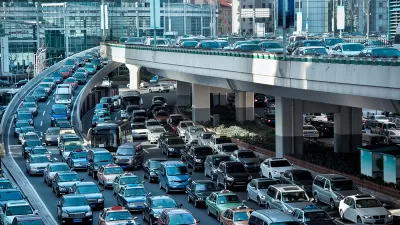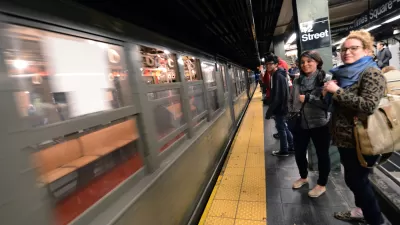According to the Census Bureau's American Community Survey on commuting to work, one subregion in the Bay Area can claim accolades for having achieved the largest drop in solo-commuting from 2006, scoring the third lowest drive-alone rate in 2013.
"Workers in the San Francisco Bay Area made the nation’s most dramatic shift from commuting via automobile to using alternative transportation between 2006 and 2013, according to a new Census Bureau report," writes Dan Walters in a Capitol Alert for The Sacramento Bee on the Census report released Thursday, August 13.
The San Francisco-Oakland-Hayward, CA metropolitan statistical area (MSA) had the third lowest rate of solo commuting in 2012 at 69.8 percent, as listed in Table 2 on page 6 of 28 [PDF] behind:
- New York-Newark-Jersey City, NY-NJ-PA: 56.9%
- Ithaca, NY: 68.7%
Compare those figures with the national drive-alone rate of 76.4 percent. However, the San Francisco MSA achieved the highest rate of decrease of solo auto commuting at 3.8%, listed on Table on page 5, followed by the MSAs of:
- Boston-Cambridge-Newton, MA-NH: 3.3%
- Durham-Chapel Hill, NC: 2.9%
Bicycling was the least popular method of commuting, used by just six-tenths of one percent of workers.
More evidence of peak car?
While the 76.4 percent drive-alone rate in 2013 is high, the press release states that "driving alone to work peaked in 2010 at 76.6 percent.
"In recent years, the percentage of workers who commute by private vehicle remained relatively stable after decades of consistent increase," writes the report's author, Brian Mckenzie, in the introduction. "For several individual years since the mid-2000s, the average number of vehicle miles traveled [VMT] in the United States has either increased at a slower pace than in previous decades or declined."
Although such shifts in travel behavior are slight, they have captured attention because they represent a disruption in an unequivocal, decades-long pattern of increased automobile travel.
Carpooling decline leads to auto commute decline
"Overall, automobile commuting has declined since 2000, in part, due to the continuation of a long-standing pattern of a decline in carpooling," notes McKenzie in a Random Samplings blog" on urban millennial commute choices.
One out of five U.S. workers carpooled in 1980, but in 2013, only one out of 10 carpooled.
McKenzie cites four 2014 research papers from the prolific Michael Sivak of the University of Michigan Transportation Research Institute (UMTRI) that ask, "Has motorization in the U.S. Peaked?"
FULL STORY: SF Bay Area commuters make big shift away from cars

Alabama: Trump Terminates Settlements for Black Communities Harmed By Raw Sewage
Trump deemed the landmark civil rights agreement “illegal DEI and environmental justice policy.”

Study: Maui’s Plan to Convert Vacation Rentals to Long-Term Housing Could Cause Nearly $1 Billion Economic Loss
The plan would reduce visitor accommodation by 25% resulting in 1,900 jobs lost.

Planetizen Federal Action Tracker
A weekly monitor of how Trump’s orders and actions are impacting planners and planning in America.

Waymo Gets Permission to Map SF’s Market Street
If allowed to operate on the traffic-restricted street, Waymo’s autonomous taxis would have a leg up over ride-hailing competitors — and counter the city’s efforts to grow bike and pedestrian on the thoroughfare.

Parklet Symposium Highlights the Success of Shared Spaces
Parklets got a boost during the Covid-19 pandemic, when the concept was translated to outdoor dining programs that offered restaurants a lifeline during the shutdown.

Federal Homelessness Agency Places Entire Staff on Leave
The U.S. Interagency Council on Homelessness is the only federal agency dedicated to preventing and ending homelessness.
Urban Design for Planners 1: Software Tools
This six-course series explores essential urban design concepts using open source software and equips planners with the tools they need to participate fully in the urban design process.
Planning for Universal Design
Learn the tools for implementing Universal Design in planning regulations.
Caltrans
Smith Gee Studio
Institute for Housing and Urban Development Studies (IHS)
City of Grandview
Harvard GSD Executive Education
Toledo-Lucas County Plan Commissions
Salt Lake City
NYU Wagner Graduate School of Public Service





























